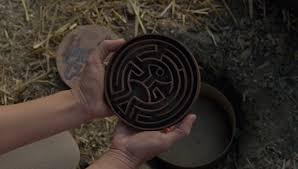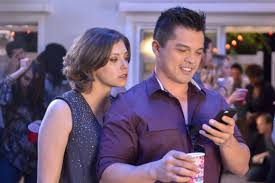“Since I was a child, I’ve always loved a good story. I believed that stories helped us to ennoble
ourselves, to fix what was broken in us, and to become the people we dreamed of
being. Lies, that told a deeper truth.”
Ford’s love of stories mirrors my own. I choose to believe that stories have
meaning, a purpose, a “deeper level” to the games they play. Whatever an individual story’s theme or
moral, they all function at a more fundamental level as simulations for
experiences we may not have had yet, or only had infrequently. These
vicarious experiences can be a sort of emotional training camp, a way of
drilling ourselves so that hopefully when the game is actually on the line, we can react
in a way that reflects more of our best images of ourselves, rather than Ellis from Die
Hard.
It’s possible this is all hogwash, of course. A convenient lie to recast the many, many
hours I spend on the couch passively absorbing someone else’s fantasies as some
roundabout form of self-improvement. But
I also know stories have shaped me in ways small and large, served to highlight
things I did not like about myself and put finer points on things I did or did not
want to be true of me. I know that watching something as
silly as Spiderman 2 actually inspired me
to want to give more and take less in my day to day life. That watching
Buffy The Vampire Slayer made
me a more conscientious and supportive friend.
That watching Eternal Sunshine Of The Spotless
Mind helped define what kind of partner I wanted to be, even before I’d
ever had a serious, committed relationship.
That watching The Wire made me
more willing to accept that every conflict in the world has people too
complicated to be called evil on both sides, and driving its most evil outcomes. That on a more basic level, Disney movies introduced me to the idea of my parents’ mortality before I was capable of
really facing it, and that stupid comedies allowed me to process that a person’s
sexual orientation was not a real concern for me before I’d
ever actually met an openly gay person. That on
an even more basic level, I am drawn most strongly to stories defined by
violent elements (see: just about every entry of this blog) because they have
an exorcizing effect on the nagging fear that when confronted with violence in
the real world, I will simply roll into a leaky ball of bodily fluids. If I experience enough violence vicariously,
then maybe when the time comes I will be able to roll into a tighter, less
leaky ball that emits sobs in a deeper, more manly timbre.
 |
| Just this year, movies taught me how to accept betrayal with equanimity. |
All of this is a way of saying that on an allegorical level,
Westworld has been saying exactly the
right things about storytelling*.
But
when it comes to actually telling a story of its own, the first season has fallen
short of the lofty promises that its pedigree, thematic aspirations, and Ford’s allegorical
proclamations laid out.
And my best explanation
for that is that the show got too enamored with storytelling craft over
storytelling function.
Alan Sepinwall
prefers to call it placing mystery before characters, but it amounts to much
the same thing.
When you prioritize
surprising the audience to such a degree that you don’t allow them to develop
actual feeling for the characters the surprise is supposed to effect, then even that victory becomes hollow.
“I’ve been very
patient, Dolores, but it’s time to give up whatever’s going on inside that head
of yours…”
Not that Westworld
was particularly triumphant in the regard of delivering basic surprise. At
least since the pilot, every major twist or revelation, give or take the
existence of a concurrent SamuraiWorld, has been guessed well in advance. The finale’s other big revelation is that
Ford has been secretly manipulating the hosts to fulfill, rather than combat,
Arnold’s last wishes. On the scale of reveals, this is certainly more
surprising than the interminably drawn out reveal that William is in fact the
Man.
 |
"I'll take "OhNoShit?" for $400, Alex."
|
But it didn’t even really register as a surprise in the moment. Because while I
may not have expected it to happen, that’s in part because I had stopped really
caring about Arnold and Robert’s struggle a week or two back, and I wanted to believe that Ford’s big heel
turns with Theresa and Bernard were a reflection of his true intentions. Not
because that motivation makes more sense or is more interesting, but because
with the entire dramatic weight of the show resting on Ford’s machinations and
attempts to thwart them, I desperately wanted those intentions to be made
knowable. That’s the tricky part about twists; for them to be really
effective, it's not enough that I didn't see it coming. I also have to care.
This twist makes Ford the only player on this
stage with any actual agency, and he was acting on motivations that were hidden
from us until the latter half of the final episode. That makes for a very frustrating season of
television, and one that won’t necessarily become less so if I revisit
it knowing that even the host’s ostensible deviations from their scripts were
just more elaborate, fuckery-laden scripts. “Wheelspinning” is a term that comes up a lot in TV criticism, but here we had something
more like gear-spinning. A series of wheels
within wheels, impressive in its clockwork intricacy but lacking a human
element to bring it fully to life. It’s,
to borrow from another adaptation of a Michael Crichton story about a futuristic
theme park being overtaken by the living attractions, all a flea circus.
Elaborate but empty spectacle.
But even if it couldn’t change the season that was, it wasn’t
a bad finale. Sure, on the one hand, it
consisted 80% of twists and turns that I had been predicting for weeks. But on the other hand, Armistice bites a guy’s
finger off and get herself a machine gun.
That makes up for A LOT. I’m
not saying Westworld would be a better show if it could somehow drop all
the sci-fi robut trappings and become a straightforward Western with Ingrid
Borso Berdal and Rodrigo Santoro as grey-hatted bandits maneuvering between Marsden’s
stalwart gunslinger and Harris’s blackhat villain. I’m just saying I’d probably
enjoy watching that show more. It’s almost a shame that Thandie Newton is going
to be submitting in the spot, because Berdal deserves a
Supporting Actress trophy for bringing such dynamic mixture of verve, menace
and playfulness to such an overwhelmingly ponderous place.
 |
If DC’s misguided Murderverse still needs to cast
a Catwoman, that search can stop right the fuck here.
|
And yes, back on that first hand, Bernard gets patched up
easily, confirming that last week’s dramatic ending to be utterly
meaningless. And somehow Tweedledee and
Tweedlesexy both lived to see the end and were apparently not caught for
betraying humanity, with Sexy barely seeming to register that the robuts had escalated
things to the level of mass murder. But
on the other, there’s the gleeful giggle Armistice gives when she gets to fire live
ammo from an automatic weapon. That marks about the only time in the entire
season when I completely, 100% shared a character’s headspace, at least for a
moment. Hopefully that won’t be such a
rare occurrence in season 2.
Westworld will have to be a very
different show when it returns. Having shown as many down cards as the finale did, it will have the opportunity to move past many
of the issues that kept me from fully connecting with it this year. With Ford the puppetmaster gone and the hosts
taking violent action that cannot be shrugged off and swept under the rug,
there will presumably be more action than scheming (“action” in the sense of people
actually acting and reacting coherently, not in the sense of gunfights where the outcome
is predetermined and nothing really at stake).
And who knows, maybe when a 70 year old Logan resurfaces to try to
wrestle control of the park back from William, or when Tweedlesexy is overcome
with remorse for abetting the murder of 2 dozen of his coworkers for really no good
reason, those guys will suddenly become more interesting and believable characters. Maybe I’ll belatedly share
in Harris’s smile when he gets shot with a real bullet once the promise of
actual stakes is fulfilled instead of teased, the way I briefly joined
with Armistice’s chortle. But I’m also going
to prepare myself for the show to promptly set about tying itself in new,
mysterious knots that continue to keep me at arm’s length from their supposed import.
 |
| Please. Just please don't say the word "maze" again. |
- No hint of resolution as to Elsie or hemsworth. Also the whole plan to smuggle data by Charlotte and British
Arsehole doesn’t go anywhere.
- And for all the ominousness of the hosts finally becoming completely murderous, the question of their sentience is not actually resolved. Dolores, Maeve and the rest are apparently still acting within their programming (be it from Ford or Arnold) when they "rise up" and start killing everyone.



